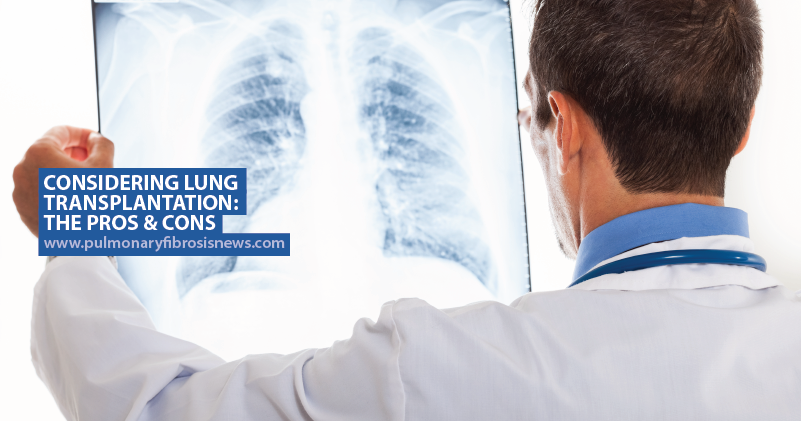-
Considering Lung Transplantation: Pros & Cons

When the only “known” cure for idiopathic pulmonary fibrosis (IPF) is removing the diseased lungs and replacing them with new ones, most people would think that opting for a double lung transplant would be a no-brainer. However, when you investigate further into transplantation surgery, including the risks and the diligence of medication management to avoid rejection post-transplant, the decision is not always an easy one.
The internet is filled with success stories of people who have been transformed through the generosity of organ donation, and thankfully, success is now the norm. However, there is another side to the story that often goes untold, which can include complications (short and long term), trauma, poor prognosis and difficulty with medication management.
There is a specific criterion that a patient has to meet even before the evaluation process begins for a double lung transplant. This meeting includes a lengthy discussion with multiple medical teams, the patient and their care providers to discuss whether or not transplant is a suitable option in the moment, at a later date or even at all. If this meeting does determine that a patient is a suitable candidate for a transplant, the next step is a comprehensive, in-hospital-based evaluation with even more medical teams spanning far beyond respiratory specialists.
With transplant being the only known “cure” for IPF, it may seem cruel to deem someone unfit for this life-saving operation. When considering the scarcity of donated organs, especially lungs, it’s important doctors give to the person who is likely to live with them the longest. Multiple factors are considered when determining the listing status of a potential lung transplant patient, including the factors that identify someone more likely to live a long life with lesser risk of rejecting the new organ.
Once a candidate has been deemed suitable for transplant, an evaluation begins which includes not only a physical evaluation of the patient’s health, but also an assessment of their mental and emotional health, as well as an understanding of the support system in place who will help care for the patient post-transplant. To help others understand the lesser-told story of transplantation, please have a read through the pros and cons list below:
Pros
- Increased ability to breathe and thus, return to normal activities of daily living.
- Truly appreciate and advocate for the senselessness of organ donation, and how it has the ability to transform lives.
- Intrinsically realize the importance of not taking life for granted.
- Live long enough to reach important milestones in one’s own life, and in the lives of those they love most.
Cons
- Enduring the painful recovery of lung transplantation surgery, including a broken sternum and learning to breathe again with the new lungs.
- A potentially lengthy stay in hospital and rehabilitation facilities.
- Risking rejection and the realistic prognosis of someone who receives a double lung transplant. A second transplant is an option for some patients; however, the prognosis is significantly decreased for someone who receives a second pair of lungs.
- Immune-compromisation: patients who receive any type of organ transplant are on anti-rejection medications for the rest of their lives, in hopes that their body will not identify the organ as foreign and start rejecting it. These medications suppress the immune system and thus, the patient is always at a heightened risk of getting sick. When a transplant patient does fall ill, it often requires hospitalization for monitoring to ensure a virus or bacteria does not settle in the new lungs.
- Likelihood of secondary disease development post-transplant, such as hypertension, diabetes or renal insufficiency.
It is because of these that a surgery of this magnitude is a very personalized choice. A patient should not be scrutinized for choosing not to pursue lung transplantation.
Sorry, there were no replies found.
Log in to reply.
